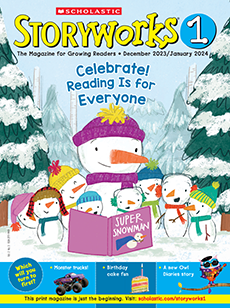1. The first Crocs were made to be worn on boats. Crocs can get wet.

The True Story of Crocs
Crocs were invented more than 20 years ago. Learn how this weird shoe took over the world.
Learning Objective: Students will follow an infographic to understand how Crocs have evolved over time.
2. The shoes looked funny! But they were comfy.
Kids started wearing them.
3. A lot of adults wanted them too. Soon there were even high-heel Crocs!
4. Then came Jibbitz. People could put their favorite things on Crocs.
Dogs can wear Crocs too!
5. Now there are so many kinds of Crocs! Which kind would you wear?
More About the Article
English Language Arts Focus
Sequencing
Nonfiction text features
Social Studies Focus
History
Implementation
- Whole group
- Small group
Pairings and Text Connections
- From the Storyworks 1 archive: “Mini History: The Story of Sneakers” (March/April 2023)
Suggested Reading Focus
Sequencing/How things change over time (20 minutes)
- Preview the article with students. Explain that it is an infographic, which arranges pictures and text in a way that gives you information. Ask them what they notice about the nonfiction features.
- Tell children that they will be learning about the history of Crocs. Build excitement by asking what they know about the shoes. Do they have a pair?
- Read the article. After each section, pause and check comprehension by asking students to summarize how the shoes have changed.
- After reading, ask students to recall how Crocs have changed over time. Summarize their learning through discussion or on chart paper.
After-Reading Skills Practice
